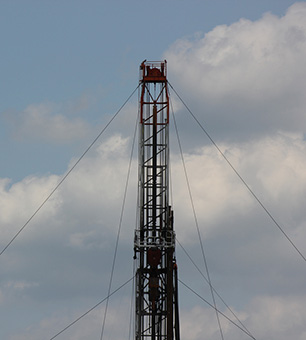Part of the Series
Gas Rush: Fracking in Depth
Pennsylvania Republicans are once again playing politics, pitting the welfare of Commonwealth residents against the natural gas industry. Here’s a hint: it’s buried deep inside the 2013-2014 fiscal code (SB 591) – Page 35 lines 20 to 22, to be exact. Those lines provide a $150,000 appropriation for “independent research regarding natural gas drilling,” and some argue that this is just another handout to the natural gas industry.
At the same time PA Republicans are handing out $150,000 for “independent research,” bi-partisan legislation that establishes a 3 million dollar health impact study is rotting in Gene Yaw’s Environmental Resources & Energy committee. Sources in Harrisburg close to the budget process confirmed that the appropriated money is going to Safer PA, a non-profit organization controlled by the gas industry lobbyists and corporations. The appropriation did not appear in the Senate’s original version, which means that it was slipped in by a member on the House Appropriations Committee. The amended version reads:
“From the funds appropriated for Environmental Program Management, $150,000 shall be used for independent research regarding natural gas drilling.”
According to their web page, the goal of Safer PA is to “achieve responsible, sustainable development of Pennsylvania’s shale resource by advancing needed technologies, analyses, and processes that ensure environmentally sound energy production.” However, the organizations and universities that are members with Safer PA include Shell Exploration & Production, Gas Technology Institute, Universal Well Services, Tetra Tech, Groundwater Environmental Services, Penn State University, Drexel University and University of Pittsburgh. Here’s a quick rundown of some of those who have benefited from or who have ties to the natural gas industry. In a state that has crumbling urban school districts, Shell received a $1.65 billion, with a “b,” tax break in the spring 2012 to build an ethane “cracker plant.” A “cracker plant” breaks down oil and gas molecules into ethylene, which is used to create plastic products. However, a year after the initial handout, the future of this “cracker plant” is in limbo, and a decision to build the plant by Shell won’t be made until 2014. Gas Technology Institute spent over $2.4 million in lobbying for natural gas the past five years. Lastly, there’s Penn State University who has had their accreditation called into question because ties university professors have had with the industry. Raging Chicken Press did reach out to Safer PA and House Appropriation Chairman William Adolph for comment. Safer PA declined to comment on the issue and Representative Adolph has not returned our requests.
In a budget season that saw attempts to privatize the state lottery system and liquor stores, to gut public employee pensions and to sprinkle mere bread crumbs to struggling school districts, leaders in the PA Republican Party found a way to muster up another gift to the gas industry.
Last spring, State Senators Stewart Greenleaf (R – Montgomery County) and John Yudichak (D – Luzerne County) introduced Senate Bill 790, a bi-partisan bill that would amend Act 13 and establish a health registry. The bill was similar to Senate Bill 1519, which was introduced to Environmental Resources and Energy committee in May 2012. SB 790 would “dedicate three million dollars to the Department of Health” to conduct studies that would determine “if health services are adequate in areas of the Commonwealth where unconventional gas well drilling occurs.” The funds would assist Geisinger Health Systems, Guthrie Health, and Susquehanna Health who are already conducting health impact studies. Like SB 1519 from the previous session, SB 790 appears to be rotting in State Senator Gene Yaw’s committee for the foreseeable future.
State Senator Gene Yaw has the power to kill bills in committee as the committee chair. On top of that, his ties to the natural gas industry make him an excellent industry gatekeeper. Reported by WNEP, Senator Yaw has close to 100 acres leased to Anadarko, and has received over $15,000 in campaign contributions from the gas industry. Because of his relationship to Anadarko, Senator Yaw has found himself in the center of controversy over the future of Loyalsock State Forest. As fate would have it, Anadarko, the company who owns Gene Yaw’s mineral rights, owns the rights to 25,000 acres of mineral rights in the Loyalsock Forest (see Wendy Lee’s article also published in Raging Chicken Press). Yaw’s connections to the gas industry have drawn action from environmental organizations. In late March, PennEnvironment delivered 12,000 petitions that opposed drilling in Loyalsock. In response to this criticism, Senator Yaw, along with House Appropriations Member Garth Everett, scheduled an invite only, closed door meeting. At the present moment, Senate Bill 790 is still sitting in committee.
These two events may be are separate from each other, but taken together they begin to pull the curtain back on the culture of corruption the natural gas has cultivated in Harrisburg. On one hand there is this reward to the gas industry to create a report that benefits the expansion of gas industry; on the other hand is this stonewalling of legislation that would have funded independent research by private medical practices.
Join us in defending the truth before it’s too late
The future of independent journalism is uncertain, and the consequences of losing it are too grave to ignore. To ensure Truthout remains safe, strong, and free, we need to raise $43,000 in the next 6 days. Every dollar raised goes directly toward the costs of producing news you can trust.
Please give what you can — because by supporting us with a tax-deductible donation, you’re not just preserving a source of news, you’re helping to safeguard what’s left of our democracy.
